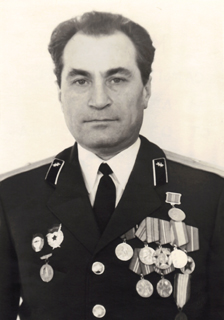An exercise in symbiosis
Permanent linkProject-managing a Russian Jewish funeral

In this photo from 1983, my father-in-law wears 30 years' worth of medals from his service in the Soviet military.
My father-in-law died last week. He was 76 and had been suffering from the effects of cancer since August. His doctors had told him he had more than a year, and he was hoping to stick around until after my husband and I had kids.
But the cancer had other plans, and he wasted away in just about three weeks. This story is about what happened after.
The immediacy of their grief transferred some of the need to act onto my shoulders from those of my husband’s mother, brother, aunts, uncle, cousin, and niece.
With a gentleness and attention to detail that is his nature, my husband took care of his father’s final wishes. He contacted a mortuary and arranged a Jewish funeral. Of course, the funeral home—the only Jewish one in Indianapolis where my husband’s family lives—managed the actual service and burial.
(As a side note: Did you know it can cost thousands of dollars for a burial plot and a simple service? I’m even more convinced of the importance of planning for this type of thing.)
I was left with the small details and the need to somehow blend the Russian secular more familiar to the family with Jewish traditions surrounding death.
Here’s a breakdown:
• Jews traditionally don’t have flowers at funerals. Instead, we place small stones when we visit a gravesite. However, Russians are all about flowers. In this case, I learned how to make a funeral wreath with supplies from a craft store and some fresh and silk flowers.
• Jews traditionally don’t have an open casket. In fact, a strict reading of halacha, or Jewish law, forbids an open casket. But Russians tend to want to say goodbye to the person rather than to his casket. And it was important for my mother-in-law to see her husband of 47 years for one last time.
• Like Jews, Russians recognize the person’s life through speeches. In fact, one of my father-in-law’s friends wrote a poem for him that she recited at the funeral home. My husband also gave a brief eulogy for his father. And I translated for the non-Russian-speaking rabbi, who shared the details of my father-in-law’s life and read prayers and psalms.
• For both Jews and secular Russians, time at the cemetery plays an important role for closure. After the funeral service, the entire group took to the cars and drove to the cemetery. It was pouring rain—the kind of weather often used as background for sad events in movies. My husband recited the Mourner’s Kaddish. But instead of clumps of mud (and it was mud because it was pouring cats and dogs the entire day), the family and friends threw flowers onto the casket. That was the invention of the funeral home director, who told the family that the gravediggers would have to wait until the soil dried a bit to actually cover the grave.
• Jews sit the seven-day mourning period of shiva. It’s the furthest away from a celebration. Instead, it’s usually a chance for people to quietly pay their respects to the family of the deceased. Visitors are the ones who bring food to the mourners.
Russians go about it in a whole different way. At a pominki, a remembrance dinner following the funeral, the deceased’s friends and family gather to toast the person’s life and to remember fun times with him. Often, alcohol flows freely at these—perhaps giving rise to the stereotype of the alcoholic Russians.
I had arranged for the food to be delivered to a community center where those who went to the cemetery would join us. Together with a sister-in-law, we arranged tables and chairs and laid out the meal. For the next five or so hours, we played hostess, serving food and drink to about 40 people (mostly my father-in-law’s friends). They chatted with my mother-in-law and toasted her husband.
Though the mood was somber at the beginning, it seemed to change as the evening wore on. People were still conscious of the photo with a black ribbon across it (the traditional Russian way of marking that the person had died). But by hour three the stories had changed in tone somewhat. They were still about my father-in-law, but he was a secondary participant, not the hero of the story now. Still later, the stories, toasts and conversations had but a tangential relationship to the man who had died just two days before. Perhaps, that’s just human nature…
Looking back on last week, I now realize that a more fitting tribute to my father-in-law was the family dinner the next night. My husband and I sat together with his mother, his aunts, uncle, and brother and sister-in-law. We shared some of the hopes for the year, things my father-in-law would have liked to have seen happen.
As the rabbi said, my father-in-law was full of the kind of spirit that the Maccabees had—he persevered in the face of hardship (growing up Jewish in the Soviet Union; fighting cancer and enjoying the ride as much as he could). And we’re the keepers of that spirit. In the end, it doesn’t matter whether his funeral or burial were Russian-Jewish or just Jewish or just Russian. The most fitting tribute is continuing on the path he started for us.



.jpg)



